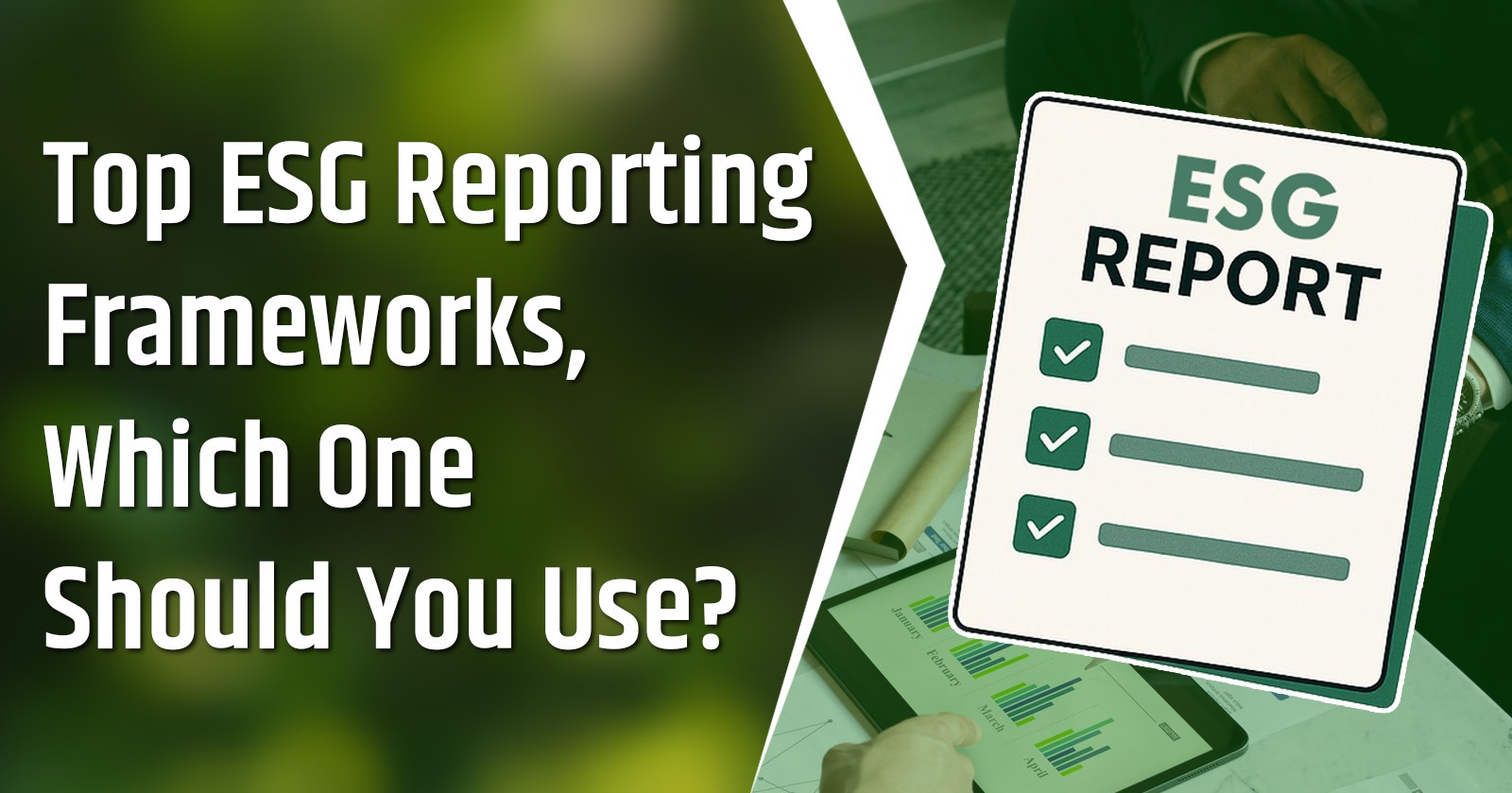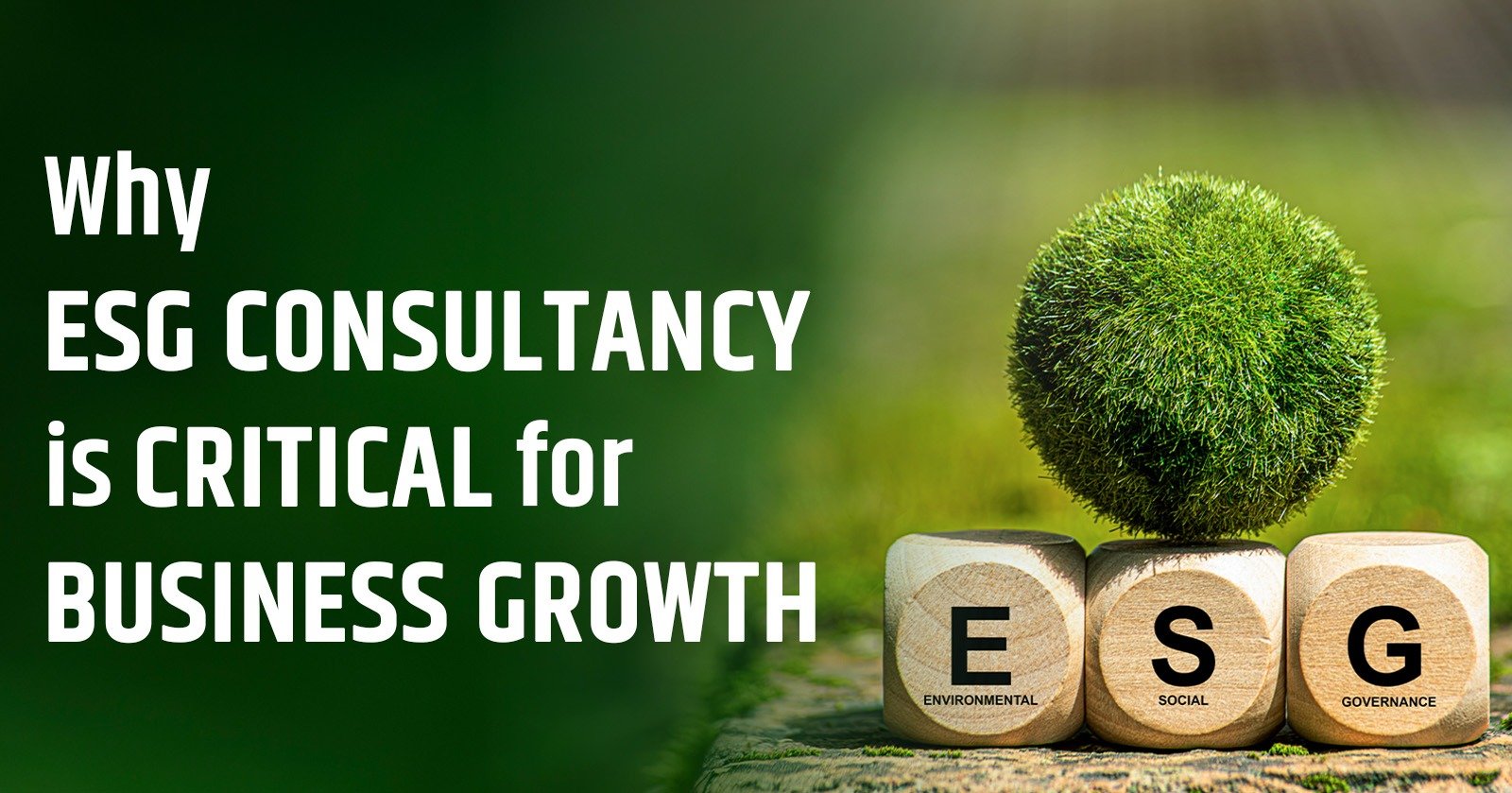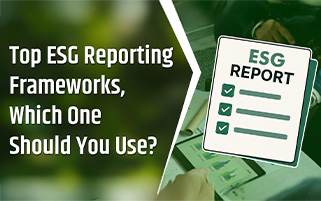Top ESG Reporting Frameworks, Which One Should You Use?

Are you confused about which ESG reporting frameworks you should follow? You’re not alone; this question comes to every businessman’s mind.
There are many ESG reporting framework options available, like BRSR,GRI, CDP, SASB, TCFD, CSRD standards, etc., and choosing the right one can be confusing. Each framework works with a different focus; some highlight financial impact, while others cover broader sustainability goals.
In this blog, we’ll explain top ESG reporting frameworks in a simple way and help you figure out which one works best for your business, whether you’re just starting your ESG journey or looking to improve your ESG reporting.
What Is an ESG Reporting Framework?
An ESG reporting framework is a set of rules or guidelines that help companies share their environmental, social, and governance (ESG) efforts in a clear and official way.
Sustainability standards help companies know exactly what ESG topics to cover in their reports. This ensures that the information is complete, clear, and transparent.
The ESG reporting frameworks are different from ESG standards. Frameworks explain how to report, while ESG standards explain what to report. Both work together to help you create an effective and complete ESG report.
By using the right framework, businesses can improve their ESG performance and avoid penalties.
Why Is ESG Reporting Essential?
ESG reporting is important for businesses because it shows how they care for the environment, people, and ethical practices.
An effective report helps companies build trust, manage risks, attract investors, and enhance their goodwill in the market. It ensures long-term growth in a sustainable way.
Overview of Major ESG Reporting Frameworks
Here’s an overview of major ESG reporting frameworks that play an important role in your ESG report. Each framework has a different role in the report. Let’s explain the ESG reporting frameworks in a simple way.
BRSR — (Business Responsibility and Sustainability Reporting) Framework
The BRSR (Business Responsibility and Sustainability Reporting) is a reporting framework made by SEBI for certain listed companies in India.
It asks companies to share information about their Environmental, Social, and Governance (ESG) efforts. This helps make transparency, responsible business, and gives investors clear and comparable ESG data to make better decisions.
GRI Standards — Global Reporting Initiative
The Global Reporting Initiative (GRI Standards) is focused on sustainability impact reports. The Global Reporting Initiative (GRI) is an international group that helps companies share reports on how they impact the environment, people, and society.
GRI Standards are the most commonly used for making sustainability reporting.
Businesses that use GRI standards often find it easier to communicate with stakeholders and handle risks better. It helps track KPI numbers to better understand your impact on the environment, economy, and society.
CSRD Framework – Corporate Sustainability Reporting Directive
The Corporate Sustainability Reporting Directive (CSRD) is a legal framework, while ESRS are the standards to be followed under it.
Companies must follow the European Sustainability Reporting Standards (ESRS) and explain how their business plans handle risks like climate change, human rights issues, and workplace safety.
CSRD standards focus on both financial and social impact; they cover several topics like employee health, fairness, and more.
TCFD Standards — Task Force on Climate-Related Financial Disclosures
The Task Force on Climate-Related Financial Disclosures (TCFD) provides a globally recognized framework of recommendations for companies to disclose climate-related financial risks and opportunities. TCFD was established by the Financial Stability Board (FSB).
CDSB Framework – Climate Disclosure Standards Board
The Climate Disclosure Standards Board (CDSB) has been consolidated into the International Sustainability Standards Board (ISSB), and its work is now part of the IFRS Sustainability Disclosure Standards.
It is a framework for reporting environmental and climate-related information that helps companies share clear environmental information via mainstream corporate reports, so investors can make better decisions.
It focuses on four main areas, including greenhouse gas emissions, climate risks, opportunities, and financial reporting related to climate change. Standardizing reporting helps attract investors. CDSB Standards work well with other standards like GRI and SASB standards.
SASB Standards — Sustainability Accounting Standards Board
The SASB standards (Sustainability Accounting Standards Board) developed a set of industry-specific ESG disclosure standards to help companies report financially relevant sustainability information to investors.
It covers five sustainability areas: social capital, environment, human capital, innovation and business model, and leadership & governance.
The Sustainability Accounting Standards Board (SASB) is a non-profit group that develops sustainability reporting standards for companies.
These SASB Standards help businesses share important information with investors. SASB standards build their standards through strong research and input from many different people.
CDP – Carbon Disclosure Project
The CDP is a non-profit organisation that collects information about companies’ environmental efforts and performance.
It works like a reporting system for environmental topics and gives companies a score to show how well they manage their impact on the environment.
Each year, companies CDP reports about their environmental efforts and how they reduce risks. Investors and businesses use this information to understand climate-related risks for those companies.
Important Terms Explained: Frameworks vs. Standards vs. Directives
Important Terms Explained: Frameworks vs. Standards vs. Directives |
||
|---|---|---|
| Type | Purpose | Examples |
| Framework | Explains how to structure and present ESG information. | TCFD, BRSR, CDSB |
| Standards | Defines what ESG topics and metrics to report. | GRI, SASB, ESRS, ISSB |
| Directive / Law | A legal rule that makes ESG reporting mandatory | CSRD (EU), SEC (US upcoming) |
| Guidelines | Rules & Practices that are best for the Company and should be followed. | UNGC, ISO 26000, OECD, ILO |
| Disclosure Platforms | Tools for submitting and scoring ESG data | CDP, DJSI, S&P CSA |
How to Choose the Right ESG Reporting Frameworks for Your Company?
There are so many ESG reporting frameworks available choosing the right frameworks can be tricky for you. Sustainability standards explain what companies should include in their ESG reports. They help make the reports more detailed, consistent, and easier for stakeholders to trust and compare.
Let’s know what you should keep in mind while choosing the right ESG reporting frameworks for your business.
- Pick an ESG reporting framework that fits your industry and company type
- Check what ESG topics the framework covers
- Make sure it meets your country’s rules and regulations, like SEBI.
- Think about who will read your report (investors, customers, employees) and what they want to know.
- Always check new rules and laws, which may require certain types of ESG reporting.
- Check if combining more than one ESG reporting framework gives you a clearer report.
Integration with Business Strategy and Compliance
Combining compliance with business strategy is important for companies that want to follow the rules and meet their ESG goals.
- Understand what compliance involves for your business, including laws, regulations, and ethical standards.
- Make sure top leaders support and treat compliance as an important part of the business.
- Make sure compliance is part of your overall business strategy.
- Set clear, measurable goals for compliance that support your business objectives and reduce risk.
- Regularly assess where your company might face compliance risks and focus on fixing the most serious ones.
- Encourage teams across departments, like legal, finance, and operations to work together on compliance efforts.
- Create strong policies and processes to monitor and manage compliance, and update them as needed to improve over time.
Mandatory vs. Voluntary ESG Reporting – Country-Wise Matrix
Understanding which ESG reporting rules are mandatory and which are voluntary can be confusing. Look at the table below to understand the main frameworks, their type, whether they are required or optional, and where they apply:
Mandatory vs. Voluntary ESG Reporting – Country-Wise Matrix |
|||
|---|---|---|---|
| Standard / Framework | Type | Voluntary / Mandatory | Region / Applicability |
| BRSR (SEBI India) | Framework | Compulsory for the top 1000 listed companies | India |
| GRI Standards | Standards | Widely used voluntarily | Global |
| SASB Standards | Standards | Voluntarily | Global (esp. USA) |
| TCFD | Framework | Mandatory in the United Kingdom, NZ, Japan | Adopting on a Global level |
| CSRD + ESRS | Directive + Standards | Mandatory | EU + non-EU firms with greater than €150M turnover in Europe |
| ISSB (IFRS S1 & S2) | Standards | Mandatory in Nigeria; in the UK from 2026, Australia | Will be reaching on Global level soon |
| CDP | Platform | Voluntary | On a Global level, mostly used in the Supply Chain |
| UNGC / ISO 26000 / OECD / ILO | Guidelines | Voluntary | Global |
| SEC Climate Disclosure (Proposed) | Law (pending) | Mandatory, expected by 2025 | Public Companies in the USA |
Benefits of Hiring a Professional ESG Consultancy For Reporting
There are several benefits of hiring an ESG consultancy for reporting, such as:
Expert Guidance on ESG Reporting Standards
ESG consultants have deep knowledge of global ESG reporting frameworks and standards like GRI, SASB, and TCFD Standards. They ensure your ESG reports meet the latest regulatory requirements and stakeholder expectations, which makes your disclosures accurate and reliable.
Make Transparency in Reports
An experienced ESG consultancy ensures your report is clear and under the official guidelines. It makes transparency in the report, which builds trust among investors, customers, and regulators.
When selecting a reporting framework, it’s important to ensure it aligns with relevant sustainability standards for your industry and region.
Customised Reporting That Aligns with Business Goals
ESG consultants customised ESG reports to meet your company’s specific risks, opportunities, and strategic objectives. This alignment ensures your reporting supports overall business growth and risk management.
Increased Stakeholder Engagement
Professional consultants help you share clear and trustworthy ESG information that makes it easier to connect with investors, customers, employees, and others. It helps to build stronger relationships and a better reputation.
Access to Advanced Tools and Technologies
Many ESG consultancies use advanced software and analytics tools to track and report ESG metrics. This technology helps to increase accuracy and allows for ongoing monitoring and improvement.
Why You Should Hire an ESG Consultancy?
You will get more benefits and growth in your business by hiring an ESG consultancy such as:
Build a Stronger Brand and Gain Investor Confidence
Hiring an ESG consultant can enhance your company’s reputation and earn trust from investors. These experts understand ESG reporting frameworks, strategies and can create effective strategies that follow ESG guidelines.
When a company cares about the environment and social issues, it shows responsibility and a commitment to sustainability. This makes it easier to meet all applicable rules and attract investors.
Find New Sustainable Business Opportunities
A sustainability advisor helps your company grow in a smart and environmentally friendly way.
With their ESG expertise, they guide you to make better decisions that support long-term success. They also find new trends and ideas that can make your business well-reputed, save operational costs, and open doors to new markets.
Enhance Employee Happiness and Loyalty
ESG consultants assist in making a positive workplace where employees feel valued and supported. This leads to happier employees, more loyal and productive.
ESG assessments help companies identify how their actions impact the environment, people, and governance. This insight helps identify areas for improvement.
Ignoring employee needs can cause problems, so ESG advisors focus on building a healthy office culture while planning the ESG strategy.
Attract More Investment
Companies that follow ESG practices attract more interest from global investors. Many investors prefer to back businesses that show responsibility and strong ESG performance.
Why Is Sustrack a Good Choice for Your ESG Reporting?
Choosing Sustrack for your ESG reporting means partnering with experts who deliver clear, accurate, and customized solutions that align with ESG reporting frameworks. We help you build trust with stakeholders and drive sustainable growth.
With Sustrack, your ESG reporting becomes transparent and effective, which drives responsible business success. Contact us today for your effective ESG reporting.
Frequently Asked Questions (FAQs)
What are ESG reporting frameworks?
ESG reporting frameworks are guidelines and standards that help companies share information about their environmental, social, and governance (ESG) activities.
They cover things like carbon emissions, energy use, worker treatment, and leadership diversity. These frameworks make ESG reports clear and easy to compare, so investors and others can understand how sustainable a company is.
How many ESG reporting frameworks are there?
There are several ESG reporting frameworks available globally. But using just one might not cover everything they need to report.
When selecting a reporting framework, it’s important to ensure it aligns with relevant sustainability standards for your industry and region.
Big companies often use several frameworks to share their sustainability efforts. For example, VMware used six different frameworks in their latest report.
What are GRI standards?
The Global Reporting Initiative (GRI’s framework) helps companies share reports on their impact on the environment, people, and society.
It focuses on sustainability. Businesses using GRI standards can share information more clearly with stakeholders and manage risks more effectively.
It also helps track key numbers (KPIs) to understand how the business affects the environment, economy, and society.
What is the role of ESG consultancies in reporting?
ESG consultancies help businesses make clear and customised ESG reports. They know global ESG reporting frameworks, SEBI guidelines, connect ESG goals with business plans, improve communication with stakeholders, and use smart tools to track progress.
What is the TCFD standard?
The Task Force on Climate-Related Financial Disclosures (TCFD standards) gives companies recommendations on how to report climate-related risks.
It helps businesses share information about climate risks and opportunities with investors and others. TCFD frameworks were established by the Financial Stability Board to help companies explain how climate change might impact their finances.




